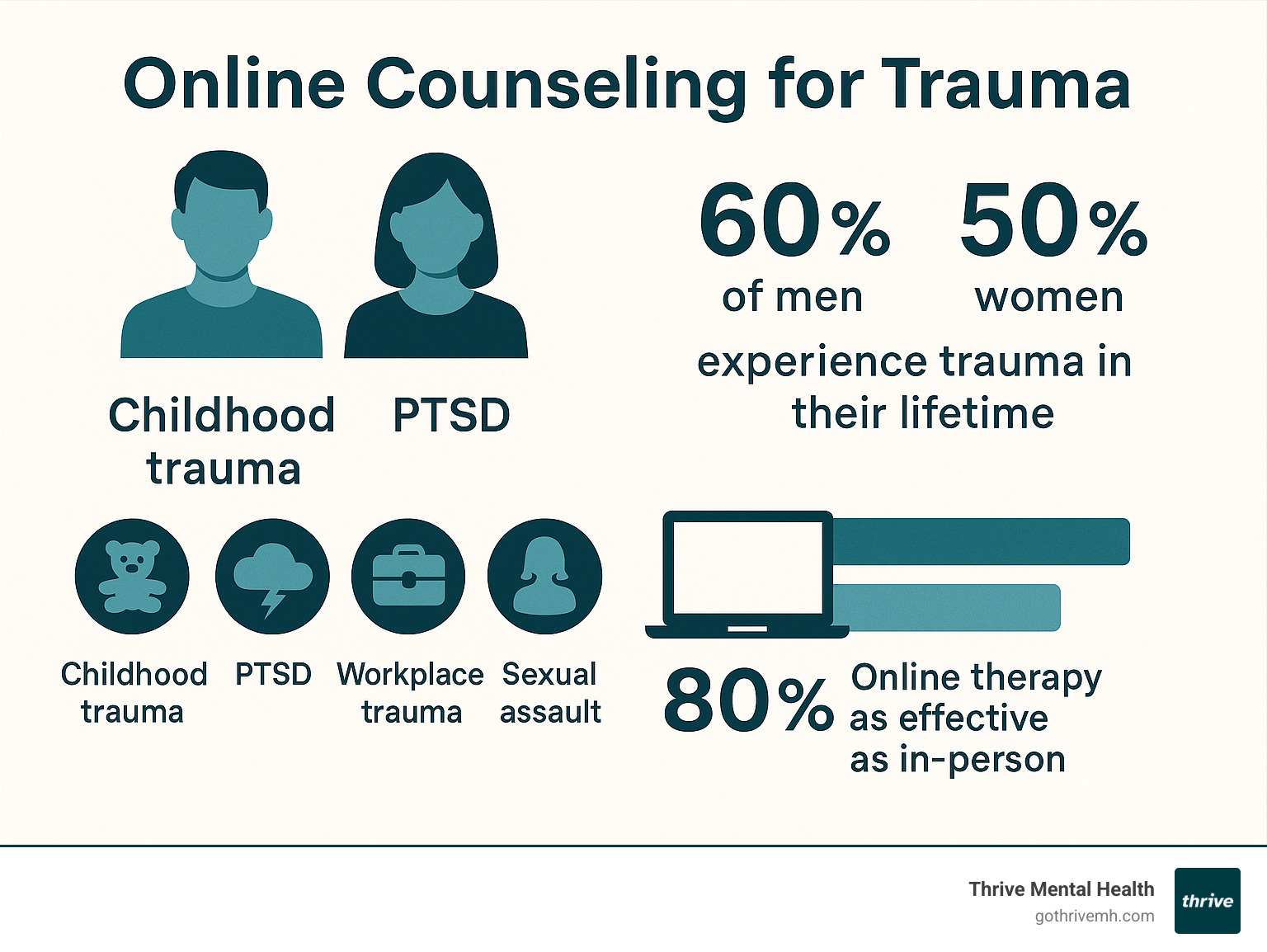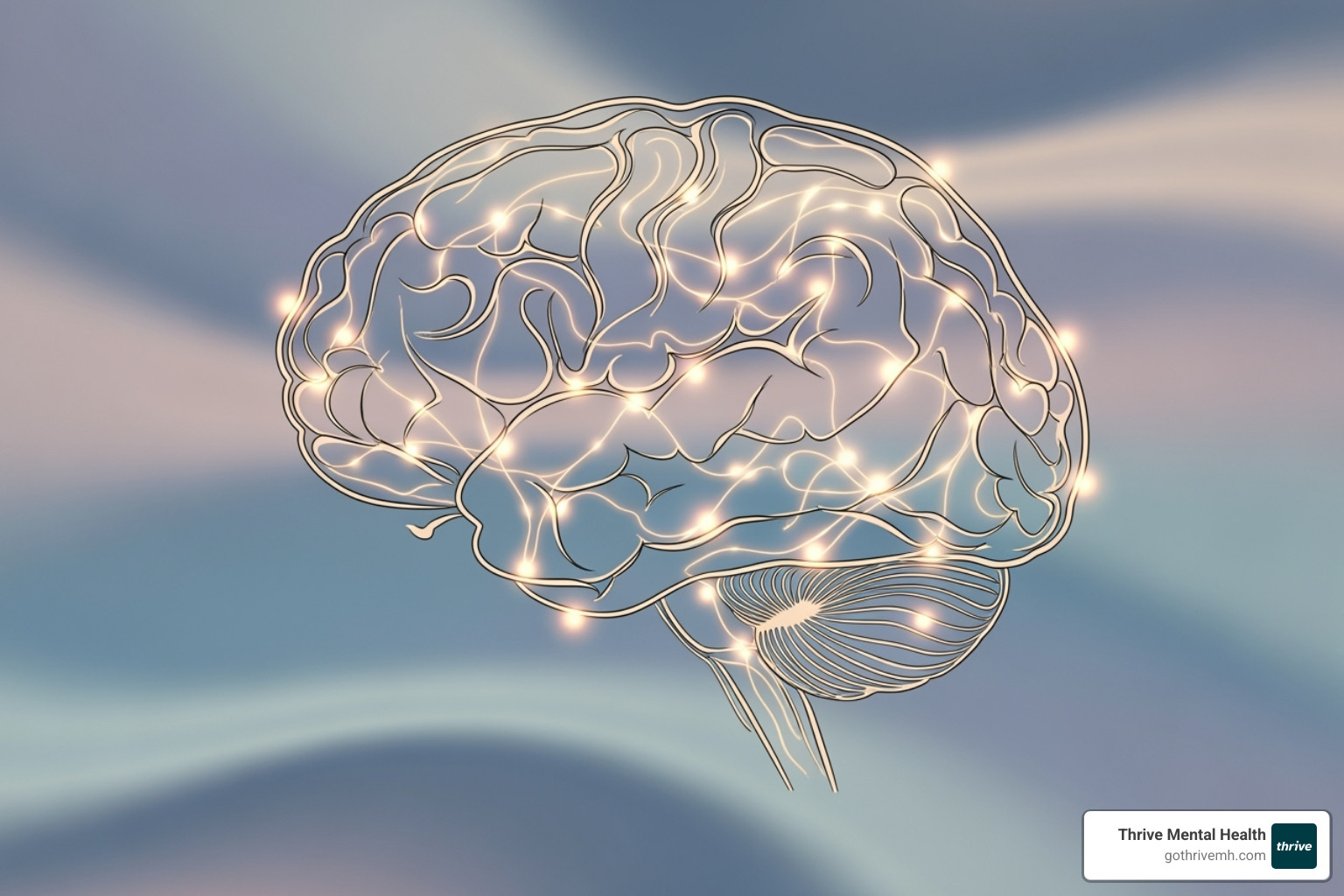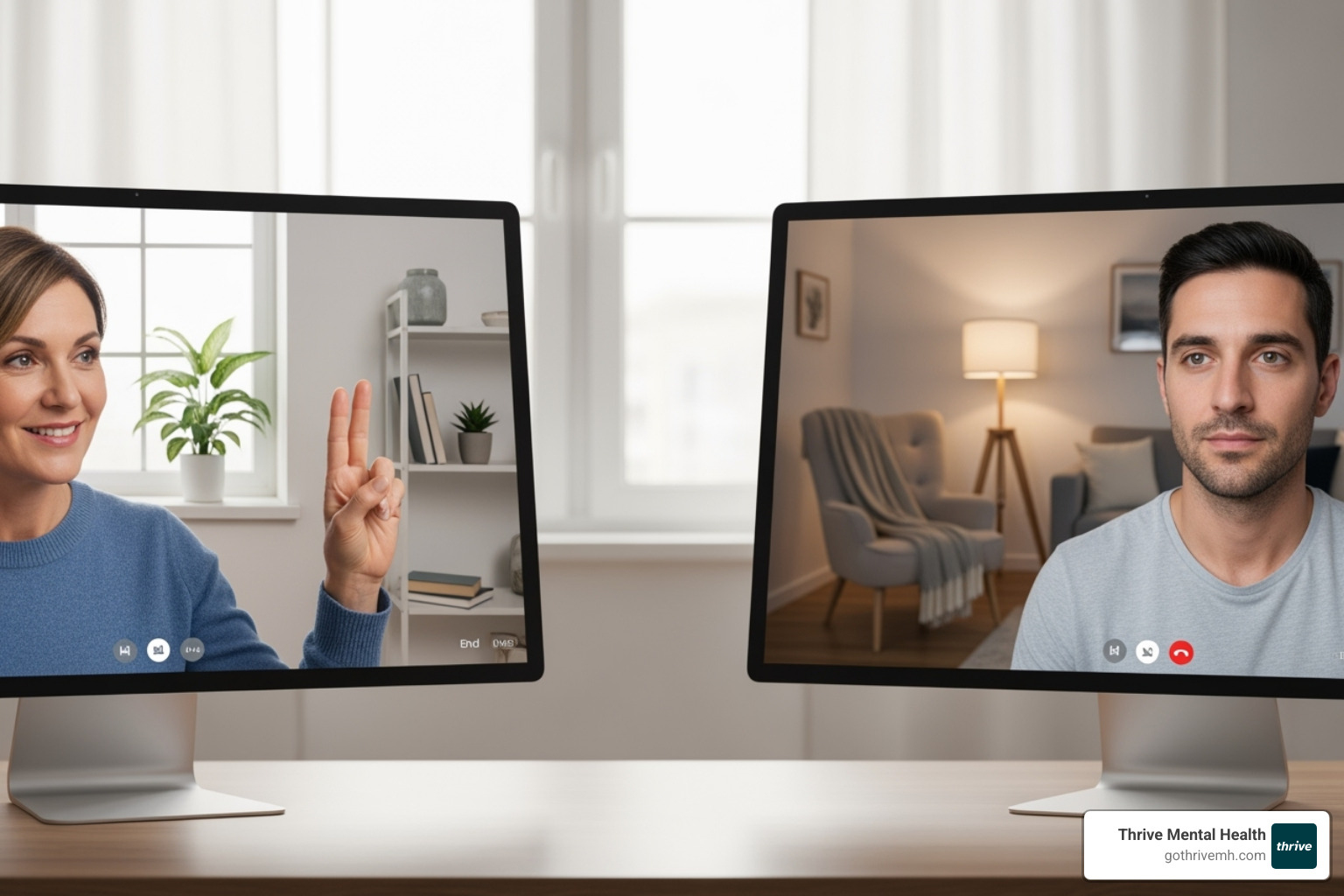Click Your Way to Calm: Online Trauma Counseling Services Reviewed

Online Counseling for Trauma: Embrace Calm 2025
Why Online Counseling for Trauma is Changing Mental Healthcare
Online counseling for trauma is a powerful solution for the millions seeking accessible mental health support. With over half of all adults experiencing at least one traumatic event, the need for flexible, effective therapy has never been greater. The shift to telehealth has made specialized trauma care more available than ever, particularly for residents across Florida.
Research confirms that online therapy is as effective as in-person treatment for trauma, with 80% of users finding it equally or more effective. Receiving care from home eliminates barriers like travel and waiting rooms, which is especially helpful for trauma survivors who may struggle with hypervigilance or social anxiety.
Unlike traditional therapy that can involve long wait times, online platforms can connect you with a trauma specialist within days. This provides the privacy and flexibility needed to address childhood trauma, PTSD, workplace stress, or recent traumatic events, especially for busy professionals in Florida.
I’m Nate Raine, CEO of Thrive Mental Health. I’ve dedicated my career to developing innovative approaches to online trauma counseling, including our virtual intensive programs for Florida residents. I’ve seen how digital therapy breaks down barriers and provides life-changing support for trauma survivors.

Understanding Trauma and Its Impact
Trauma is an emotional response to an overwhelming event that exceeds your ability to cope, leaving lasting marks on your mind and body. During a traumatic event, the brain’s filing system gets overloaded. Instead of organized memories, it stores fragments—images, sensations, and emotions—which can resurface unexpectedly as physical symptoms like nausea or a tight chest.
Trauma isn’t one-size-fits-all. “Big T” traumas are life-threatening events like serious accidents or violent attacks. But “Little T” traumas, such as a sudden loss, a painful divorce, or a job loss, can be just as devastating by shattering your sense of security. Online counseling for trauma recognizes that both types deserve serious attention.
Trauma can leave your body’s fight-or-flight response stuck in the “on” position. This constant state of alert, fueled by stress hormones, can rewire your brain and lead to long-term health issues. Understanding this is the first step toward healing. For a deeper dive, see A Beginner’s Guide to Understanding Trauma.

Signs You May Need Trauma Therapy
Trauma symptoms can appear immediately or years later. Recognizing them is key to getting help.
- Hypervigilance: A state of constant alertness, scanning rooms for threats, or always feeling that danger is near. It’s your nervous system on overdrive.
- Flashbacks and Nightmares: Vivid, intrusive re-experiences of the traumatic event that feel like they’re happening in the present moment.
- Avoidance Behaviors: Actively staying away from people, places, or thoughts that remind you of the trauma. This can make your world feel smaller and smaller.
- Anxiety, Panic Attacks, and Depression: Intense anxiety about being anxious, or a heavy blanket of depression that makes once-enjoyable activities feel pointless.
- Relationship Issues: Difficulty trusting others, feeling disconnected, or struggling with vulnerability, which can strain personal connections.
- Physical Symptoms: Unexplained headaches, stomach issues, chronic pain, or dizziness can be your body’s way of holding onto trauma. Sleep and concentration issues are also common.
If you’re a Florida resident struggling to function at work, maintain relationships, or care for yourself, it’s time to seek support. For a full overview, read our guide on Understanding Post Traumatic Event Symptoms and Recovery Paths.
Common Types of Trauma
Understanding different trauma types can help you find the right path to healing.
- Childhood Trauma: Abuse, neglect, or instability during critical developmental years can lead to complex PTSD (CPTSD), affecting relationships and worldview into adulthood. Learn more in Overcoming Childhood Trauma: Healing into Adulthood.
- Post-Traumatic Stress Disorder (PTSD): Often associated with combat, PTSD can result from any terrifying event, such as car accidents or domestic violence. Millions live with undiagnosed symptoms. You can learn more about PTSD.
- Workplace Trauma: Common among first responders, this results from repeated exposure to traumatic events and can lead to moral injury, depression, anxiety, or PTSD.
- Betrayal Trauma: Occurs when a trusted person or institution violates that trust, creating unique challenges for healing.
- Sexual Trauma: Any non-consensual sexual experience, which can have devastating effects. Specialized, trauma-informed care is essential for recovery.
Online counseling for trauma in Florida makes specialized care for these experiences accessible, breaking down barriers to healing.
Comparing Evidence-Based Online Trauma Therapies
Finding the right therapy for trauma recovery is easier when you understand your options. Online counseling for trauma in Florida offers several evidence-based therapies proven to be effective virtually. Research, such as the review in Treating PTSD: A Review of Evidence-Based Psychotherapy Interventions, confirms these methods help people reclaim their lives. The key is finding the approach that fits your needs.
- Cognitive Behavioral Therapy (CBT): Focuses on changing negative thought patterns linked to trauma. Online sessions use video calls and digital worksheets to help you reframe distorted thinking, making it effective for anxiety and depression.
- Eye Movement Desensitization and Reprocessing (EMDR): Helps the brain process traumatic memories without extensive discussion. Online EMDR uses screen-guided eye movements or other forms of bilateral stimulation to reduce the emotional charge of memories, which is great for flashbacks and nightmares.
- Somatic Therapy: Recognizes that trauma is stored in the body. Guided exercises via video help release physical tension and address symptoms like dissociation and hypervigilance.
- Dialectical Behavior Therapy (DBT): Builds skills for managing intense emotions and relationships. Online DBT combines individual and group sessions, making it ideal for complex trauma and emotional dysregulation.

Cognitive Behavioral Therapy (CBT) for Trauma
CBT is a highly researched and effective treatment for trauma that adapts well to an online format. It teaches you to investigate the connections between your thoughts, feelings, and behaviors. Trauma can create distorted beliefs like “nowhere is safe.” CBT helps you examine the evidence and develop more balanced perspectives.
In online counseling for trauma using CBT, your Florida-licensed therapist guides you through structured sessions. You’ll use digital worksheets to identify thought patterns and practice new responses. Trauma-Focused CBT (TF-CBT) goes a step further by helping you safely and gradually face trauma-related memories to reduce their emotional power. The online format is practical, allowing you to apply new skills in your real-world environment. Learn more in our guide on Cognitive Behavioral Therapy.
Eye Movement Desensitization and Reprocessing (EMDR)
EMDR is a unique, evidence-based approach that helps your brain process traumatic memories without requiring you to discuss painful details at length. While you briefly focus on a memory, your therapist guides you through bilateral stimulation (like specific eye movements). This helps reduce the memory’s emotional intensity, making it feel like a past event rather than a present threat.
Online counseling for trauma in Florida using EMDR employs sophisticated virtual tools, such as on-screen guides or audio cues, to deliver this therapy effectively. Many people notice significant improvements in symptoms like nightmares and flashbacks in just a few sessions. EMDR is endorsed by major health organizations worldwide. For a deeper look, explore How EMDR Therapy Reduces PTSD Symptoms and Boosts Mental Health and Exploring EMDR Therapy Techniques for Trauma Recovery.
Intensive Programs for Deeper Healing
Sometimes, weekly therapy isn’t enough for complex or long-standing trauma. If you’ve experienced multiple traumas or feel stuck in individual sessions, an intensive program can provide the comprehensive support you need. These programs are immersive healing experiences, combining individual counseling, group therapy, and specialized techniques like CBT, DBT, and EMDR into a coordinated plan.
Online counseling for trauma through intensive programs allows you to do deep, transformative work without upending your life. Our Virtual Intensive Outpatient Programs (VIOP) at Thrive Mental Health are designed for adults and young professionals in Florida who need more than weekly therapy but can’t commit to residential treatment. The virtual format offers flexibility with the structure needed for profound healing. Group therapy within these programs helps reduce the shame and isolation of trauma by connecting you with others who understand.
For Florida residents seeking this level of care, our Virtual Intensive Outpatient Program (VIOP) offers a path to intensive healing that fits your daily life.
Your Practical Guide to Starting Online Counseling for Trauma
Taking the first step toward online counseling for trauma in Florida is a courageous act. Virtual therapy removes many barriers, offering access to specialists from the comfort of your home, without the stress of waiting rooms or traffic.
When searching for a therapist in Florida, look for specialists with training in trauma-focused approaches like EMDR, TF-CBT, or somatic therapy. These credentials signify expertise in helping people heal from traumatic experiences. Reputable platforms verify licenses and screen therapists for their skills.
Before your first session, find a quiet, private space and check your tech. It’s normal to feel nervous, but remember your therapist is there to support you. Being honest about your goals—even if it’s just “I want to feel better”—helps build a strong therapeutic alliance, a key predictor of successful treatment. For more guidance, see our guide on How to Choose the Right Individual Online Counseling Service for Your Needs.

What to Look for in an Online Therapy Platform
Choosing the right platform for online counseling for trauma is crucial for feeling safe. Here’s what to prioritize:
- HIPAA Compliance: This is your guarantee of confidentiality. Look for platforms that use encrypted video and secure messaging. The Summary of the HIPAA Security Rule explains these protections.
- User-Friendly Interface: Technology shouldn’t add stress. The platform should be simple and intuitive so you can focus on your healing.
- Flexible Communication: The best platforms offer video, audio-only, and messaging options, giving you control over how you connect with your therapist.
- Therapist Licensing and Specialization: Ensure therapists are licensed to practice in your state. For Florida residents, verify they meet Florida Counseling Licensure Guidance Procedures. Most importantly, confirm the platform has therapists who specialize in trauma-informed care.
Navigating Cost and Insurance for Online Counseling for Trauma
Understanding the financial side of online counseling for trauma is empowering. Online therapy has made quality care more affordable.
Many platforms use subscription models ($60-$90/week), which can be cost-effective if you need frequent contact. Others use per-session pricing ($125-$275), similar to traditional therapy.
The good news is that insurance coverage for online therapy has expanded dramatically. Many platforms are in-network with major insurance plans, meaning you might only have a small copay.
Contact your insurance provider to ask about your in-network and out-of-network telehealth benefits. When exploring platforms, look for a tool to check your coverage. For intensive support like our Virtual Intensive Outpatient Program in Florida, explore Virtual IOP Insurance options, as coverage may differ. Even if a therapist is out-of-network, your plan might reimburse a portion of the cost. Understanding how Medical Insurance Cover Therapy works can remove a major barrier to your recovery.
Frequently Asked Questions about Online Trauma Therapy
Considering online counseling for trauma brings up valid questions. Here are answers to the most common concerns.
Is online therapy as effective as in-person for trauma?
Yes. Research consistently shows that online therapy is just as effective as in-person treatment for trauma and PTSD. Studies demonstrate that the therapeutic alliance—the trusting bond with your therapist—forms just as powerfully through a screen. For many, the comfort and privacy of being at home actually improve the healing process. The convenience also improves consistency, which is crucial for trauma recovery.
How long does online trauma therapy take?
The timeline is personal and varies based on the type of trauma and the therapeutic approach. Some people see improvement in 8-12 sessions with focused therapies like EMDR or trauma-focused CBT. Those with complex trauma may benefit from longer-term therapy. The goal isn’t speed, but steady progress. Focus on the skills you’re building and the positive changes in your daily life. For helpful strategies, see our guide on Effective Strategies for Managing Trauma and Its Triggers.
What is the difference between a therapist and a psychiatrist for trauma treatment?
Therapists provide psychotherapy (talk therapy) to help you process trauma and develop coping skills. They cannot prescribe medication. Psychiatrists are medical doctors who specialize in mental health and can prescribe medications to manage symptoms like severe anxiety or depression, which can make therapy more effective. Many people benefit from a collaborative approach combining both. If you’re exploring medication, options like a Medicaid Covered Psychiatrist in Florida can work with your therapist to provide comprehensive support.
Take the First Step Toward Healing Today
You don’t have to walk through your trauma journey alone. Online counseling for trauma in Florida offers a proven, accessible path to healing that fits into your life. From the security of your own home, you can access evidence-based therapies that have helped millions of survivors.
The benefits are clear: work with specialized, Florida-licensed trauma therapists without the stress of commutes or waiting rooms, schedule sessions around your commitments, and begin healing in an environment where you feel truly safe.
Healing isn’t about forgetting what happened. It’s about reclaiming your power, managing triggers, and building a life where your past informs your strength. You deserve to thrive, not just survive.
At Thrive Mental Health, we know that sometimes more intensive support is needed. Our comprehensive virtual programs are designed for Florida residents who are ready for deep, transformative work. We combine the flexibility of online care with the power of evidence-based treatments like EMDR, CBT, and DBT.
If you’re ready to take that brave first step, we’re here to support you. Your journey to healing can start today.
Find how we can support your mental health journey: Enhancing Mental Health Support with Evernorth.